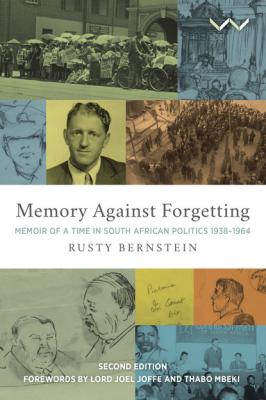ТОП просматриваемых книг сайта:
Memory Against Forgetting. Rusty Bernstein
Читать онлайн.Название Memory Against Forgetting
Год выпуска 0
isbn 9781776141562
Автор произведения Rusty Bernstein
Жанр Биографии и Мемуары
Издательство Ingram
Memory Against Forgetting
Memory Against Forgetting
Memoir of a Time in South African Politics
1938 – 1964
Second Edition
Rusty Bernstein
Wits University Press
1 Jan Smuts Avenue
Johannesburg 2001
Second edition first published in South Africa in 2017
Copyright © Bernstein Family 2017
Photographs © Individual copyright holders
Courtroom sketches by Hilda Bernstein, 1963/1964 © Bernstein Family 2017
First edition published by Viking/Penguin Books (South Africa) (Pty) Ltd 1999
ISBN 978-1-77614-154-8 Print
ISBN 978-1-77614-155-5 PDF
ISBN 978-1-77614-156-2 EPUB
All rights reserved. No part of this publication may be reproduced, stored in a retrieval system, or transmitted in any form or by any means, electronic, mechanical, photocopying, recording or otherwise, without the written permission of the Publisher, except in accordance with the provisions of the Copyright Act, Act 98 of 1978.
All images remain the property of the copyright holders. The Publisher gratefully acknowledges the institutions and individuals referenced in the captions. Every effort has been made to locate the original copyright holders of the images reproduced. Please contact Wits University Press at the address above in case of any omissions or errors.
Project managed by Hazel Cuthbertson
Edited by Pat Tucker
Cover designed by Fire and Lion
Typeset by Newgen
For Hilda, without whose courage, persistence and love neither my children nor I would have come through. And for all those who resisted apartheid and finally laid it low, but whose courage and sacrifices are now in danger of being forgotten
The struggle of man against power is the struggle of memory against forgetting.
Milan Kundera
Contents
The Rivonia Trial Attorney Remembers: Lord Joel Joffe
Photographic plates follow
7A Line in the Sand
8Goodbye to All That
9Overground– Underground
10To Speak of Freedom
11Power, Treason & Plot
12Cracking the Fortress Wall
13Exercise Behind Bars
14To Put Up or Shut Up
15Things Fall Apart
16To Sit in Solemn Silence
17In a Deep Dark Dock
18Telling it as it Was
19In a Closing Net
20Over, and Out
Epilogue
Notes
Index
Biography
Rusty (Lionel) Bernstein 1920–2002
Rusty Bernstein was born to a middle-class family of Jewish émigrés. He was orphaned at the age of eight and he and his three siblings were raised by relatives. He finished his education at Hilton College, where he excelled academically although he hated the ethos of the school. After studying architecture at the University of the Witwatersrand, Rusty worked as an architect in Johannesburg.
Rusty joined the South African Communist Party and the Labour League of Youth, where he met Hilda, an immigrant from Britain. They were married in 1941. During the Second World War, Rusty served as a gunner in the South African army in North Africa and Italy, returning to South Africa in 1946.
Rusty was a private and reticent person, and a sensitive and articulate writer who wrote extensively for a number of journals. After the banning of the Communist Party in 1950, Rusty was active in forming the underground party and the Congress of Democrats, an organisation for whites that cooperated with the African National Congress, which at that time was restricted to black membership only. Rusty played a crucial role in drafting the 1954 Freedom Charter, writing the document’s opening slogan, ‘Let us speak of freedom’, and giving its demands a sense of purpose with phrases like ‘the people shall govern’, and ‘all shall be equal before the law’.
In 1956, Rusty was arrested with 150 others and charged with treason, but acquitted after a trial lasting four years. In 1960 following the Sharpeville massacre both Rusty and Hilda were arrested and held for months without trial and were eventually released under banning orders.
Rusty was arrested again in 1963 at Liliesleaf Farm with leaders of the high command of Umkhonto we Sizwe, the military wing of the ANC. In what became known as the Rivonia Treason Trial, Nelson Mandela and seven of the other accused were sentenced to life imprisonment. Rusty was acquitted but immediately re-arrested. While out on bail, he and Hilda escaped into exile.
In London, Rusty practiced as an architect and continued to work for the ANC. He returned to South Africa in 1994 to run the ANC’s press office during the first democratic election. Rusty was awarded the Order of Luthuli (Gold) posthumously for his political activism.
Foreword
Thabo Mbeki
May 2017
Having read Memory Against Forgetting, I realise that, quite in error, for many years I thought as a matter of fact that I knew everything I needed to know about many phases of the struggle for the

